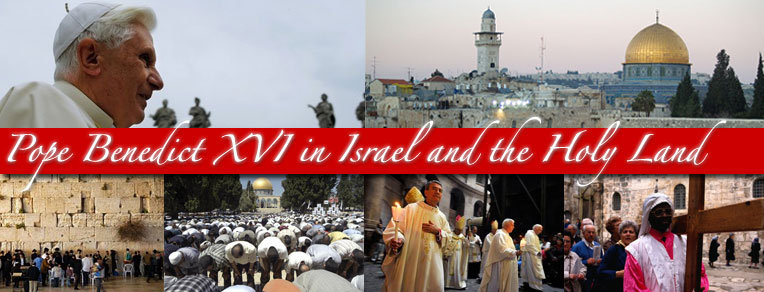- Responding to the concerns of Palestinian Christians:
The worries – I would even say, the anguish – are in part legitimate, but I want to underline that they were – and still are here and there – felt by the Arab Christians living in the Territories and in Jerusalem. The reality of the Christians who live in Israel, and all the more so that of the Christians of Jordan is an entirely different one; they see the pope’s visit in a different light. In a diocese that lives extremely differing realities, we must try to have a more global vision of this visit and to consider it in all its dimensions: political and social and human and religious.
- On whether the Holy Father should have waited "for a better time", in light of the Israeli-Palestianian conflict in Gaza:
So what should be done? Wait for better times? But this region is never at peace! Wait until the Palestinian question is resolved? I’m afraid that two or three sovereign pontiffs will pass before it is definitively settled.
It’s the story of the glass that is half full or half empty… Some say: “The situation is difficult, so it would be better if he didn’t come.” Others on the contrary say: “The situation is difficult, so it would be better if he came.” And that is our position. During these difficult times, I want the Holy Father to come to help us to “superare”: to go beyond, to see further.
The pope is coming to visit all the Churches, all the people who live in the Holy Land in order to encourage us to remain faithful to our mission, to our faith, and to our awareness of belonging to this Land.
- On Israel's expected use of the visit for public-relations:
Israel will do all it can to present its country in the best light. I understand that, it is its right.
It is not our task to criticize or to denounce what the others do. Our job is to do our part to make the visit as pastoral as possible; it is our responsibility to do our part so that our Christians might have the possibility to see the Holy Father, to pray with him and to hear his message of peace and of justice for all. If one studies all the messages published by the Holy See concerning the Holy Land, Iraq and the Middle East, one can see that we have an unheard of capital of addresses, support, interventions that are rich in humanity, the Christian spirit and justice. There is no doubt that the Holy Father will continue in this sense during his visit to the Holy Land.
It falls upon us, the local Church, to watch over the program’s equilibrium: the sites to visit, the persons to meet, the addresses to be made. It is our job “to give the Holy Father a helping hand”.
- On relations between Israel and the Vatican:
It is difficult to find a good balance and to maintain it. Having said that, the more the Vatican is a friend of Israel’s, the more it will be able to draw profit from that friendship for greater peace and justice. If the tension continues between the universal Catholic Church and Israel, we will all lose, we Christians and we Arabs. On the other hand, if Israel trusts the Holy See entirely, based on that friendship, the Holy See will be able to speak of truth, of justice and of peace. For with the language of friendship, it is possible to say things to one another that one would refuse to hear if it came from an enemy.
Being friends and speaking as such is good for everyone: for the friend, for Israel, and for the others. I just hope that the Holy See’s friendship with Israel is reciprocal.
Saturday, April 18, 2009
Interview with Fouad Twal on Benedict XVI's visit to the Holy Land
Subscribe to:
Post Comments (Atom)




No comments:
Post a Comment